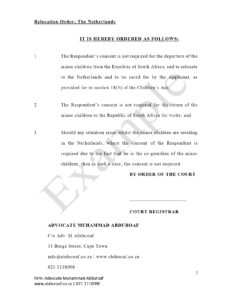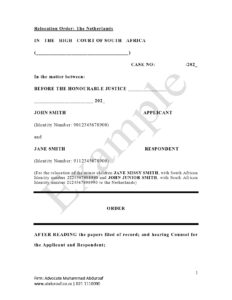Free quick fast Cheap Divorces South Africa Abduroaf
Powered by the Firm Advocate Muhammad Abduroaf – Consulting from: The Grove Exchange (Ideas Cartel) 11 Grove Ave, Claremont, Cape Town, 7708
Free quick fast Cheap Divorces South Africa Abduroaf
 Relocation consent for minor child to the Netherlands – Advocate Muhammad Abduroaf[/caption]
Relocation consent for minor child to the Netherlands – Advocate Muhammad Abduroaf[/caption]Drenthe (province), Meppel, Flevoland (province), Lelystad, Friesland (province), Leeuwarden, Sneek, Gelderland (province), Nijmegen, Renkum, Rheden, Tiel, Zutphen, Groningen (province), Groningen, Limburg (province), Kerkrade, Maastricht, Roermond, Sittard, Tegelen, Venlo, Noord-Brabant (province), Oss, Roosendaal, ’s-Hertogenbosch, Tilburg, Noord-Holland (province), the Netherlands, Den Helder, Marken, Velsen, Volendam, Zaanstad, Overijssel (province), Kampen, Zwolle, Utrecht (province), Soest, Utrecht, Zeist, Zeeland (province), Middelburg, Vlissingen, Zuid-Holland (province), The Hague, Scheveningen, Katwijk, Leiden, Lisse, Rijswijk, Rotterdam, Schiedam, Vlaardingen, Zoetermeer, Caribbean Netherlands (special municipalities), Bonaire (special municipality), Saba (special municipality), Sint Eustatius (special municipality), Aruba (unitary state), Oranjestad, San Nicolas, Curaçao (unitary state), Willemstad, Sint Maarten (unitary state)
(https://www.britannica.com/topic/list-of-cities-and-towns-in-the-Netherlands-2055398)
18 Parental responsibilities and rights
(1) A person may have either full or specific parental responsibilities and rights in respect of a child.
(2) The parental responsibilities and rights that a person may have in respect of a child, include the responsibility and the right-
(a) to care for the child;
(b) to maintain contact with the child;
(c) to act as guardian of the child; and
(d) to contribute to the maintenance of the child.
(3) Subject to subsections (4) and (5), a parent or other person who acts as guardian of a child must-
(a) administer and safeguard the child’s property and property interests;
(b) assist or represent the child in administrative, contractual and other legal matters; or
(c) give or refuse any consent required by law in respect of the child, including-
(i) consent to the child’s marriage;
(ii) consent to the child’s adoption;
(iii) consent to the child’s departure or removal from the Republic;
(iv) consent to the child’s application for a passport; and
(v) consent to the alienation or encumbrance of any immovable property of the child.
(4) Whenever more than one person has guardianship of a child, each one of them is competent, subject to subsection (5), any other law or any order of a competent court to the contrary, to exercise independently and without the Consent of the other any right or responsibility arising from such guardianship.
(5) Unless a competent court orders otherwise, the Consent of all the persons that have guardianship of a child is necessary in respect of matters set out in subsection (3)(c).
Now let us explain what Parental Responsibilities and Rights are.(a) to care for the child;
(b) to maintain contact with the child;
(c) to act as guardian of the child; and
(d) to contribute to the maintenance of the child.
Therefore, if a parent has parental responsibilities and rights over a minor child, and accordingly, rights of guardianship, their Consent is required when it comes to issues of guardianship. As seen from section 18(3)(c) of the Children’s Act above, both parents’ Consent is required should a minor child depart from the Republic of South Africa. In this case, to emigrate to the Netherlands. Even if the minor child only wants to go for a short holiday to the Netherlands, both guardians’ Consent would be required.19 Parental responsibilities and rights of mothers
(1) The biological mother of a child, whether married or unmarried, has full parental responsibilities and rights in respect of the child.
(2) If-
(a) the biological mother of a child is an unmarried child who does not have guardianship in respect of the child; and
(b) the biological father of the child does not have guardianship in respect of the child, the guardian of the child’s biological mother is also the guardian of the child.
(3) This section does not apply in respect of a child who is the subject of a surrogacy agreement.
As seen from section 19(1) of the Children’s Act, in most cases involving the relocation of a minor child to the Netherlands, the mother’s Consent is required as she has full parental responsibilities and rights over the minor child.20 Parental responsibilities and rights of married fathers
The biological father of a child has full parental responsibilities and rights in respect of the child-
(a) if he is married to the child’s mother; or
(b) if he was married to the child’s mother at (i) the time of the child’s conception; (ii) the time of the child’s birth; or (iii) any time between the child’s conception and birth.
As can be seen from sections 20 (a) and (b) of the Children’s Act, if the father and the mother were married, or are married, then his Consent is required for the minor child to relocate to the Netherlands. Of course, an exception to this would be should a court of law order otherwise. This would be the case should the parents be divorced and the divorce court ordered that only the mother may act as guardian. Next, we deal with the issue of an unmarried father’s Consent to relocate a minor child to the Netherlands.21 Parental responsibilities and rights of unmarried fathers
(1) The biological father of a child who does not have parental responsibilities and rights in respect of the child in terms of section 20, acquires full parental responsibilities and rights in respect of the child-
(a) if at the time of the child’s birth he is living with the mother in a permanent life-partnership; or
(b) if he, regardless of whether he has lived or is living with the mother-
(i) consents to be identified or successfully applies in terms of section 26 to be identified as the child’s father or pays damages in terms of customary law;
(ii) contributes or has attempted in good faith to contribute to the child’s upbringing for a reasonable period; and
(iii) contributes or has attempted in good faith to contribute towards expenses in connection with the maintenance of the child for a reasonable period.
(2) This section does not affect the duty of a father to contribute towards the maintenance of the child.
(3) (a) If there is a dispute between the biological father referred to in subsection (1) and the biological mother of a child with regard to the fulfilment by that father of the conditions set out in subsection (1) (a) or (b), the matter must be referred for mediation to a family advocate, social worker, social service professional or other suitably qualified person.
(b) Any party to the mediation may have the outcome of the mediation reviewed by a
court.
(4) This section applies regardless of whether the child was born before or after the commencement of this Act.
As can be seen from the latter sections, a father of a child born out of wedlock does not automatically have parental responsibilities and rights over his minor child. He may however acquire those parental responsibilities and rights over his minor child if he is materially involved in the child’s life. That would be where the father and the mother were in a permanent life partnership when the child was born or he is meaningfully involved in the child’s life, as outlined above. We shall not go into much detail regarding that. However, in most cases, if the father had regular contact with the child and paid child support, he would have acquired parental responsibilities and rights over the minor child.(5) Unless a competent court orders otherwise, the Consent of all the persons that have guardianship of a child is necessary in respect of matters set out in subsection (3)(c).
Therefore, after your Court Application has been launched an both sides have been heard, the Court would make the necessary Order. If you are successful in your application for the relocation of your minor children to the Netherlands, then the Court will make an Order similar to that which is shown below. [caption id="attachment_10805" align="alignnone" width="715"] Relocation consent Order for minor child to the Netherlands – Advocate Muhammad Abduroaf[/caption] [caption id="attachment_10806" align="alignnone" width="694"]
Relocation consent Order for minor child to the Netherlands – Advocate Muhammad Abduroaf[/caption] [caption id="attachment_10806" align="alignnone" width="694"] Relocation consent Order for minor child to the Netherlands – Advocate Muhammad Abduroaf[/caption]
Relocation consent Order for minor child to the Netherlands – Advocate Muhammad Abduroaf[/caption]